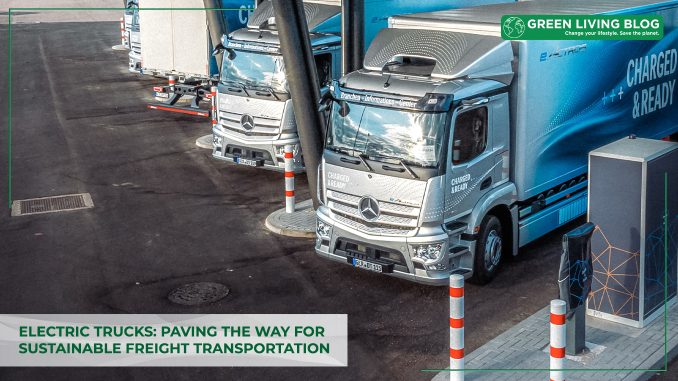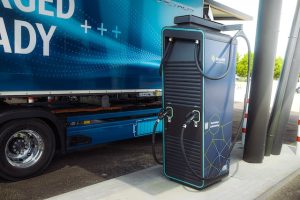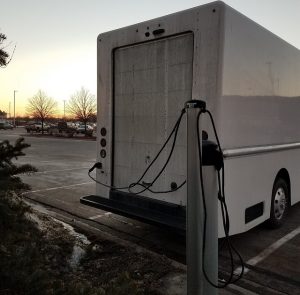
Electric trucks are becoming increasingly popular in the transportation industry as companies strive to reduce their carbon footprint and promote sustainability.
These vehicles use electric motors powered by batteries instead of traditional combustion engines, making them a more environmentally friendly option for freight transportation.
In this article, we will delve deeper into how electric trucks are revolutionizing the freight transportation industry.
We’ll explore their advantages, the challenges faced in their adoption, and the prospects of this sustainable transportation option.
The Need for Change in the Freight Industry

The demand for electric trucks stems from a growing recognition of the urgent need to shift towards cleaner, sustainable modes of transport to mitigate the effects of climate change. Conventional trucks, powered by diesel engines, contribute significantly to air pollution and greenhouse gas emissions. With the freight industry expected to grow in the coming years, these environmental impacts are only predicted to intensify.
The transition to electric vehicles and trucks is driven by both environmental and economic factors. On the environmental front, electric trucks produce zero tailpipe emissions, thereby significantly reducing the carbon footprint of freight transport. From an economic perspective, electric trucks offer potential cost savings over their lifespan. They have fewer moving parts than their conventional counterparts, resulting in lower maintenance costs. Additionally, the decreasing cost of batteries makes electric trucks an increasingly competitive option.
According to a 2021 study from the Lawrence-Berkeley National Lab, an electric semi-truck would cost around $1.51/mile driven, while a diesel-powered semi-truck has an ownership cost that is 13% higher, at $1.72 per mile. This adds up over the lifespan of the vehicle!
Advantages of Electric Trucks

Apart from their environmental benefits, there are several other advantages to using electric trucks for freight transportation.
- Lower Operating Costs
Electric trucks have a lower cost per mile compared to traditional diesel trucks. This is because electricity is generally cheaper than diesel fuel and requires less maintenance. Additionally, some states and countries offer incentives and subsidies for companies that switch to electric vehicles, further reducing operating costs. For example, programs like Washington’s Clean Fuel Standard offer companies that switch to electric vehicles rebates for every metric ton of carbon emissions avoided through the use of electric power.
- Reduced Noise Pollution
Electric trucks significantly reduce noise pollution due to their quiet electric motors. This makes them perfect for deliveries in urban areas during late hours when noise restrictions are in place.
- Better Performance
Many electric trucks have a smoother and faster acceleration compared to diesel trucks, making them more efficient for stop-and-go city driving. They also have fewer moving parts, resulting in less wear and tear and longer lifespans.
- Sustainability
Electric trucks do not produce any emissions, making them an excellent option for companies looking to reduce their carbon footprint and meet sustainability goals. Additionally, advancements in battery technology have increased the range of electric trucks, allowing them to compete with traditional diesel trucks on longer routes.
Challenges of Electric Trucks and Solutions

While electric trucks have numerous benefits, there are also some challenges that need to be addressed for wider adoption in the transportation industry. These include:
- Limited Infrastructure
One of the main issues with electric trucks is the availability of charging infrastructure. Companies and governments will need to invest in building a robust network of charging stations to support the widespread use of electric trucks.
- High Initial Cost:
The upfront cost of purchasing an electric truck is currently higher than traditional diesel trucks. However, as the technology develops and becomes more mainstream, the costs are expected to decrease. Overall costs of electric trucks typically are lower compared to traditional vehicles over time if you take fuel and maintenance costs into account.
- Battery Range and Charging Time
Although battery technology has improved significantly, electric trucks still have a limited range compared to diesel trucks. This means that companies will need to plan their routes carefully and account for charging times in their schedules.
- Weight Restrictions
Electric trucks are heavier due to the weight of the battery, which can limit the amount of cargo they can carry. However, advancements in battery technology and truck design are continually being made to address this issue.
To overcome these challenges, various solutions are being explored, such as:
- Investment in Infrastructure
Governments and companies are investing in building charging infrastructure, including fast-charging stations along major routes. This will allow electric trucks to recharge quickly and efficiently, making longer trips more feasible.
- Financial Incentives
Governments are offering financial incentives for companies to switch to electric trucks, such as tax breaks or subsidies. This can help offset the higher initial cost of purchasing an electric truck and encourage wider adoption.
- Collaboration with Energy Companies
Some companies are partnering with energy companies to develop innovative solutions, such as using renewable energy sources to power charging stations. This not only reduces the environmental impact of electric trucks but also provides a more sustainable source of energy.
Final Thoughts
In conclusion, electric trucks are progressively transforming the landscape of freight transportation, promising a future of sustainable logistics. While they currently face challenges related to cost, battery range, and weight restrictions, the collective efforts of governments, businesses, and energy companies to overcome these obstacles are promising.
As technological advancements continue to unfold, and as infrastructure keeps improving, electric trucks will likely become a common sight on our highways. This transition towards electric vehicles is not only essential for environmental sustainability, but it also unlocks new opportunities for businesses to run their operations more efficiently and cost-effectively.
![]()
Author Profile

- Eco Warrior by day, Eco Blogger by night trying to get the eco balance right.
Latest entries
 EnvironmentMarch 31, 20255 Sustainable Materials for Building Your Dream Eco-Friendly Pergola
EnvironmentMarch 31, 20255 Sustainable Materials for Building Your Dream Eco-Friendly Pergola Best practicesMarch 25, 202510 Green Tips to Live a More Sustainable Lifestyle
Best practicesMarch 25, 202510 Green Tips to Live a More Sustainable Lifestyle Green Expert GuidesMarch 12, 2025Flexible Solar Panels for Trucks: Benefits of Smarter Solar Energy Solutions for the Trucking Industry
Green Expert GuidesMarch 12, 2025Flexible Solar Panels for Trucks: Benefits of Smarter Solar Energy Solutions for the Trucking Industry Green Home GuidesFebruary 27, 2025How Sustainable Heating is made simple with Bioethanol Fireplaces
Green Home GuidesFebruary 27, 2025How Sustainable Heating is made simple with Bioethanol Fireplaces





Leave a Reply
You must be logged in to post a comment.